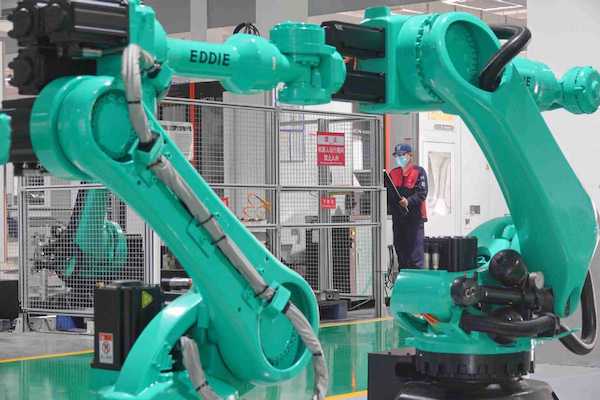
- Home
- Media Center
-
Events
- Wuzhen Summit
- Regional Forums
- Practice Cases of Jointly Building a Community with a Shared Future in Cyberspace
- World Internet Conference Awards for Pioneering Science and Technology
- The Light of Internet Expo
- Straight to Wuzhen Competition
- Global Youth Leadership Program
- WIC Distinguished Contribution Award
- Membership
- Research & Cooperation
- Digital Academy
-
Reports
- Collection of cases on Jointly Building a Community with a Shared Future in Cyberspace
- Collection of Shortlisted Achievements of World Internet Conference Awards for Pioneering Science and Technology
- Reports on Artificial Intelligence
- Reports on Cross—Border E—Commerce
- Reports on Data
- Outcomes of Think Tank Cooperation Program
- Series on Sovereignty in Cyberspace Theory and Practice
- Other Achievements
- About WIC
- 中文 | EN

Report: AI's role in driving growth bigger

An employee operates equipment at a smart production facility in Yantai, Shandong province, in November. TANG KE/FOR CHINA DAILY
Companies integrating cutting-edge tech show competitive advantages
Chinese enterprises are planning to increase investment in artificial intelligence as AI is increasingly perceived as one of the drivers in revenue growth and business transformation and integrated into the real economy, according to a new report from global consultancy Accenture.
The report said 34 percent of surveyed Chinese companies used more than 30 percent of their tech budgets for AI projects in 2021. By 2024, the percentage of companies investing over 30 percent of their tech budgets in AI is expected to increase to 64 percent.
AI has become an important competitive advantage for enterprises. Research has found that 13 percent of surveyed Chinese enterprises have used AI to outpace their competitors. This group is dubbed "AI Achievers", with a score of 64 on the maturity scale, almost double that of others and correlating with 50 percent higher revenue growth than their peers.
AI maturity is the degree to which companies outperform their peers in a combination of AI-related foundational and differentiating capabilities, which include cloud computing, data and AI algorithms, as well as AI strategy, talent and innovation culture, Accenture said.
The report estimated the proportion of "AI Achievers" will increase rapidly to 34 percent by 2024. In addition, more than half of the surveyed Chinese enterprises are "AI Experimenters", who have barely scratched the surface of AI's potential and lack mature AI strategies and related capabilities.
Although some industries like high-tech are currently far ahead in their AI maturity, the gap will likely narrow considerably by 2024.There is enormous room for growth in AI adoption across all industries and opportunities for those companies that choose to seize it, the report noted.
For instance, the automotive sector is betting on a big surge in sales of AI-powered self-driving vehicles, while aerospace firms anticipate continued demand for AI-enabled remote systems. The life sciences industry will expand its use of AI in efficient drug development.
The research surveyed 250 Chinese companies in 17 industries, including retail, telecommunications, chemicals, energy, financial services and healthcare between July and September, with their sales revenue surpassing $1 billion in 2021.
"We believe every part of every business must be transformed by technology, data and AI, in some cases resulting in total enterprise reinvention," said Sanjeev Vohra, global lead for applied intelligence at Accenture.
"Adopting AI at scale and embedding it deeper in all aspects of business is no longer a choice but a necessity and opportunity facing every industry, organization and leader," Vohra added.
AI, a key technology for driving digital transformation, is playing an increasingly important role in accelerating China's push for industrial upgrading and promoting the in-depth integration of the digital economy and the real economy.
China has issued a plan setting benchmarks for its AI sector, with the value of core AI industries predicted to exceed 1 trillion yuan ($143.6 billion), making China one of the global leaders in such innovation by 2030.
According to the Ministry of Industry and Information Technology, the value of China's core AI industries exceeds 400 billion yuan and the number of related enterprises stands at more than 3,000, with breakthroughs being made in key core technologies such as smart chips and open-source frameworks.
An increasing number of Chinese companies will achieve digital transformation with the help of data and AI, said Chan Tzeh Chyi, managing director of strategy and consulting, applied intelligence lead and chief data scientist at Accenture Greater China.
He added that business executives should accelerate steps to promote the large-scale use of AI, prioritize long and short-term AI investment and allow AI to better integrate into enterprises' overall strategies.
Xiang Ligang, director-general of the Information Consumption Alliance, a telecom industry association, underscored the significance of developing digital technologies represented by AI, which will inject fresh impetus into the country's economic growth and speed up digital and intelligent upgrades in enterprises.
The in-depth integration of digital technologies with the real economy will further reinforce China's advantages in global supply chains, he said.

The World Internet Conference (WIC) was established as an international organization on July 12, 2022, headquartered in Beijing, China. It was jointly initiated by Global System for Mobile Communication Association (GSMA), National Computer Network Emergency Response Technical Team/Coordination Center of China (CNCERT), China Internet Network Information Center (CNNIC), Alibaba Group, Tencent, and Zhijiang Lab.





